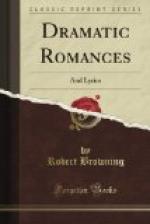II
Just as perhaps he mused, “My plans
That
soar, to earth may fall, 10
Let once my army-leader Lannes
Waver
at yonder wall.”
0ut ’twixt the battery-smokes there flew
A
rider, bound on bound
Full-galloping; nor bridle drew
Until
he reached the mound.
III
Then off there flung in smiling joy,
And
held himself erect
By just his horse’s mane, a boy:
You
hardly could suspect
20
(So tight he kept his lips compressed
Scarce
any blood came through)
You looked twice ere you saw his breast
Was
all but shot in two.
IV
“Well,” cried he, “Emperor, by God’s
grace
“We’ve
got you Ratisbon!
“The Marshal’s in the market-place,
And
you’ll be there anon
To see your flag-bird flap his vans
Where
I, to heart’s desire,
30
Perched him—” The chief’s eye
flashed; his plans
Soared
up again like fire.
V
The chief’s eye flashed, but presently
Softened
itself, as sheathes
A film the mother-eagle’s-eye
When
her bruised eaglet breathes,
“You’re wounded!” “Nay,”
the soldier’s pride
Touched
to the quick, he said:
“I’m killed, Sire!” And his chief
beside,
Smiling
the boy fell dead. 40
Notes: “Incident of the French Camp.” A story of modest heroism. The incident related is said by Mrs. Orr to be a true one of the siege of Ratisbon by Napoleon in 1809—except that the real hero was a man.
I. Ratisbon: (German Regensburg), an ancient city of Bavaria on the right bank of the Danube, has endured seventeen sieges since the tenth century, the last one being that of Napoleon, 18O9.
II. Lannes: Duke of Montebello, one of Napoleon’s generals.
THE PATRIOT
AN OLD STORY
I
It was roses, roses, all the way,
With
myrtle mixed in my path like mad:
The house-roofs seemed to heave and sway,
The
church-spires flamed, such flags they had,
A year ago on this very day.
II
The air broke into a mist with bells,
The
old walls rocked with the crowd and cries.
Had I said, “Good folk, mere noise repels—
But
give me your sun from yonder skies!”
They had answered, “And afterward, what else?”
10




